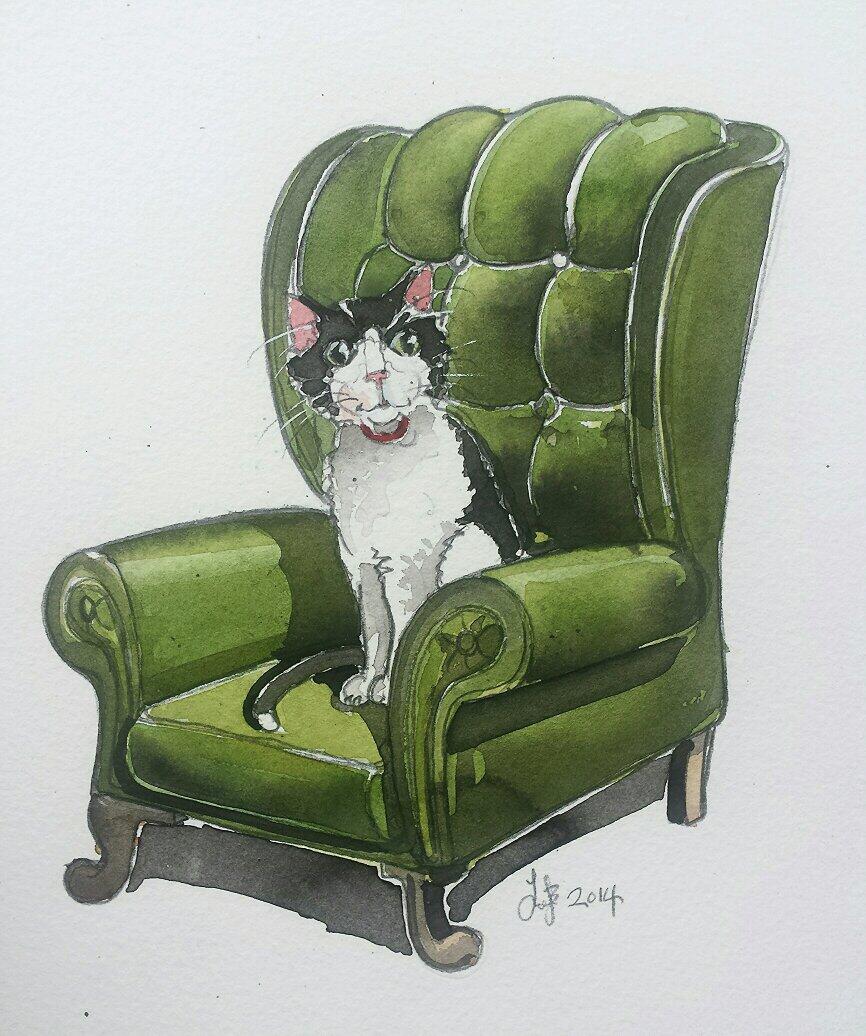Cognitive Behavioural Therapy (CBT)
I’ve recently taken up a more research based role, so am currently reading through some CBT course notes.
Guess what my daily CBT mood diary revealed from a few years ago? That one of my most enjoyable daily activities was arriving home from work to be greeted by my cat Poppy and subsequently snuggling up on the sofa together.
The image attached to this blog is one that my partner Liam painted for me of our delightful cat Poppy sitting in my “shrink chair” as Liam calls it. Poppy, our adorable Celia Hammond rescue cat, from East London is now approaching the dear old age of 14 bless her and has given us both years of pleasure. She is such a Jekyll and Hyde character too: elegant, a Hyacinth Bucket type princess during the daytime and a pub hard case after 8pm.
Cats, Pets and Counselling Research
This then led me to question, with my shrink hat on, why is spending time in Poppy’s company so uplifting no matter how hectic and stressful my day has been.
One of the reasons why most pets are therapeutic is because they fulfill the basic human need to touch. People need touch to survive as well. Children who are touch-deprived don’t grow emotionally, physically and cognitively. Director of The Touch Research Institute, Dr Tiffany Field, cites a television show on Romanian orphans who are stick thin and unable to walk until aided by massage therapy and proper nutrition. Dr Field comments, “A child’s first emotional bonds are built from physical contact, laying the foundation for further emotional and intellectual development.”
Even hardened criminals in prison have shown long-term changes in their behavior after interacting with pets, Stroking, holding, cuddling, or otherwise touching a loving animal can often quickly calm and soothe us when we are feeling stressed. Pet companionship can also help overcome loneliness.
According to the American Heart Association, the ownership of pets has reduced risk for heart disease and greater longevity. There is also research indicating that playing with or snuggling up to these delightful furry friends has several physical and mental health benefits. It’s only recently that studies have begun to scientifically explore the benefits of the human-animal bond.
Studies have also found that:
• Pet owners are less likely to suffer from depression than those without pets.
• People with pets have lower blood pressure in stressful situations than those without pets.
• Playing with a pet can heighten levels of serotonin and dopamine, which calm and relax.
• Heart attack patients with pets survive longer than those without.
In other words, like counselling, therapy and mindfulness, pets, though to a lesser degree, can also help us to self-regulate. Having said that, pets are a huge commitment and so are not for everyone. If you are one of those people who either dislike or have no desire to own a pet, then perhaps you may want to consider other ways of self regulating, reducing stress and blood pressure levels such as counselling and mindfulness.
Over to you
If after reading this blog you realise that stroking your cat or pet is not enough to help you overcome low moods, anxiety, stress and feeling overwhelmed with distractions and negative thoughts you are not alone in this very common dilemma. So don’t panic or give up just yet.
On line counselling or a personal development or mindfulness course can help you. So, if you need a bit of extra support and encouragement and a few on line counselling sessions why not contact me to arrange an appointment or for a short free introductory chat on 07950 751352 or by emailing me on info@karendeeming.com.



![Karen_Deeminga[1]](http://www.karendeeming.com/wp-content/uploads/2015/09/being-practice-self-portrait-e1541437891746.jpg) Welcome to my site. if you have any queries then please
Welcome to my site. if you have any queries then please

